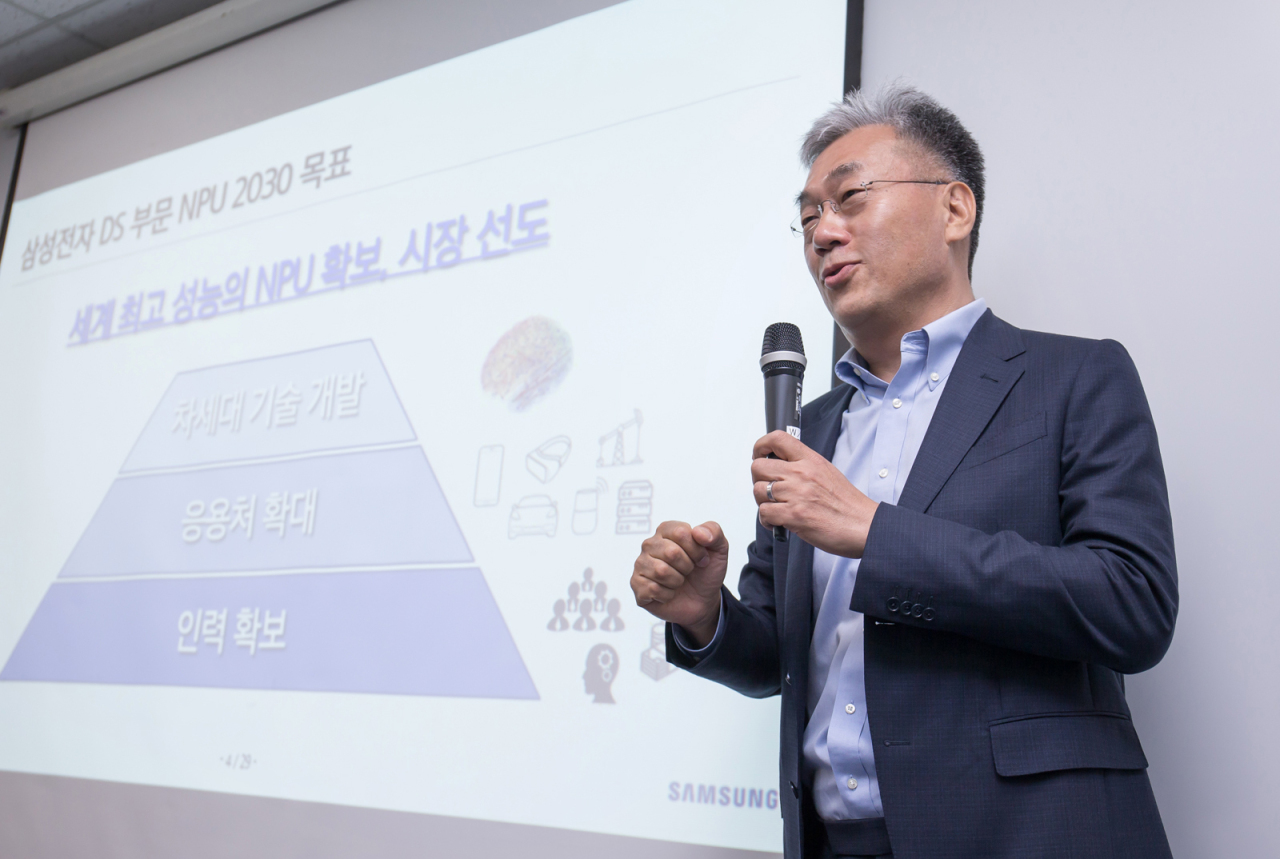Samsung’s system chip head says M&As needed for non-memory goal
Top memory chip provider announces plan to solely develop NPUs, neuromorphic processors to realize on-device AI
By Song Su-hyunPublished : June 18, 2019 - 15:56
Samsung Electronics will aggressively push for mergers and acquisitions of startups and sizable global businesses in the field of non-memory semiconductors, said the head of its system-on-chip business on Tuesday.
Kang In-yup, president of the system LSI business of Samsung’s device solutions division, emphasized that Samsung “is open to M&As,” after announcing his unit’s plan to accelerate the development and commercialization of neural processing units and NPU-equipped end-to-end solutions to help realize on-device artificial intelligence.
“It’s impossible to expect organic growth to become the top player in this field,” Kang said. “We will consider both small and big M&As to secure talent.”
There have been rumors that Samsung could acquire system-on-chip companies like NXP from the Netherlands. However, Kang declined to mention any particular firm.
Kang In-yup, president of the system LSI business of Samsung’s device solutions division, emphasized that Samsung “is open to M&As,” after announcing his unit’s plan to accelerate the development and commercialization of neural processing units and NPU-equipped end-to-end solutions to help realize on-device artificial intelligence.
“It’s impossible to expect organic growth to become the top player in this field,” Kang said. “We will consider both small and big M&As to secure talent.”
There have been rumors that Samsung could acquire system-on-chip companies like NXP from the Netherlands. However, Kang declined to mention any particular firm.

Samsung is spurring efforts to achieve its goal of becoming the world’s No. 1 system chip maker by 2030. It announced the goal in April with a 133 trillion won ($112 billion) investment plan.
The NPU technology development plan was unveiled officially as part of the 2030 initiative.
The NPU is a core part of a SoC that processes data inside an integrated circuit. It is widely likened to the brain in the human body.
To improve capabilities of AI platforms on devices, NPUs are necessary, as they enable data processing in low-power and out-of-network environments.
For NPUs alone, Samsung plans to create over 2,000 related jobs worldwide by 2030, expanding its current NPU workforce by 10 times.
Samsung’s Montreal AI Lab in Canada and Samsung Advanced Institute of Technology in Korea will work together on the development of NPU technologies that will further evolve into neuromorphic processor technologies, which will support level 4 autonomous driving solutions, naturally speaking personal AI assistant programs, mixed reality technologies and humanoids.
Commercialization will be led by the system LSI business with a goal of supplying NPU-based processors not only for high-end and mid-range smartphones but also for automotive applications.
“For the coming age of AI, Samsung is committed to delivering industry-leading advancements brought to life by our NPU technologies,” Kang said. “As we leverage our differentiated technology, close partnerships with global institutes and active investment in top talent, we are excited to take future AI processing capabilities to the next level.”
Samsung started scouting outside experts on NPUs in 2012, and embarked on R&D in 2014.
It commercialized its first-generation NPU through the launch of mobile processors Exynos 9610 and 9820 last year. The latest Galaxy S10 series features the Exynos 9820.
Applications for Samsung’s NPUs will expand into areas such as automotive processors that power in-vehicle infotainment and advanced driver assistance systems, as well as next-generation data centers optimized for big data processing, according to the company.
By Song Su-hyun (song@heraldcorp.com)









![[Kim Seong-kon] Democracy and the future of South Korea](http://res.heraldm.com/phpwas/restmb_idxmake.php?idx=644&simg=/content/image/2024/04/16/20240416050802_0.jpg&u=)







![[KH Explains] Hyundai's full hybrid edge to pay off amid slow transition to pure EVs](http://res.heraldm.com/phpwas/restmb_idxmake.php?idx=652&simg=/content/image/2024/04/18/20240418050645_0.jpg&u=20240418181020)

![[Today’s K-pop] Zico drops snippet of collaboration with Jennie](http://res.heraldm.com/phpwas/restmb_idxmake.php?idx=642&simg=/content/image/2024/04/18/20240418050702_0.jpg&u=)